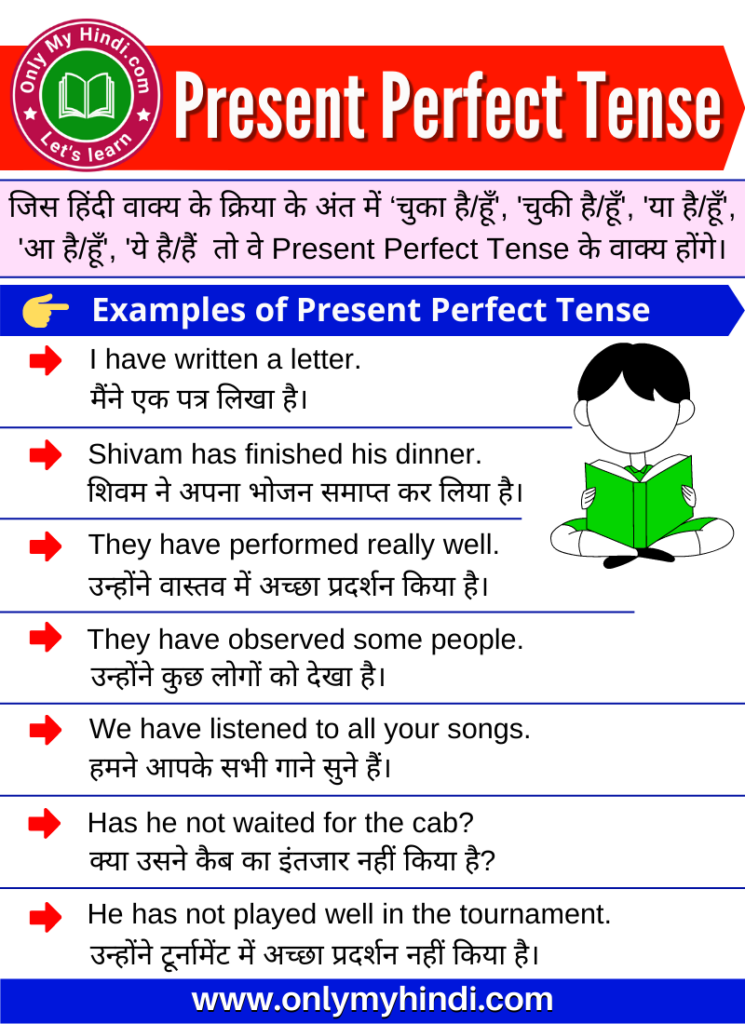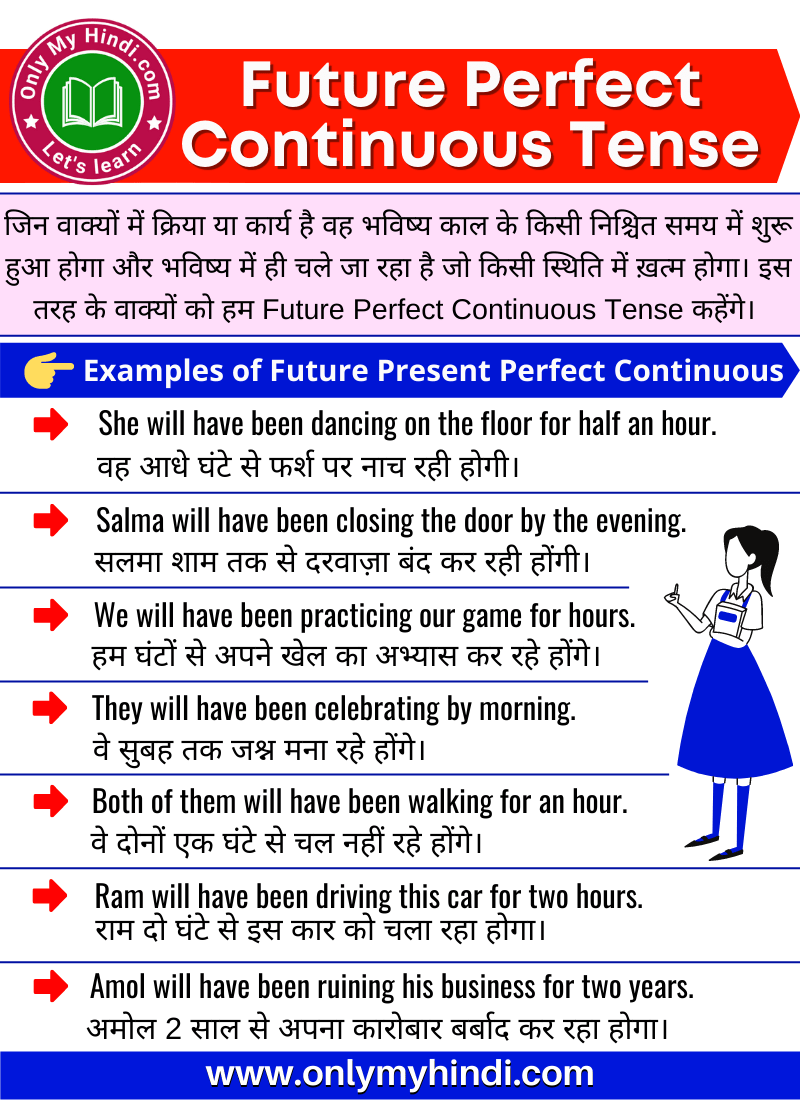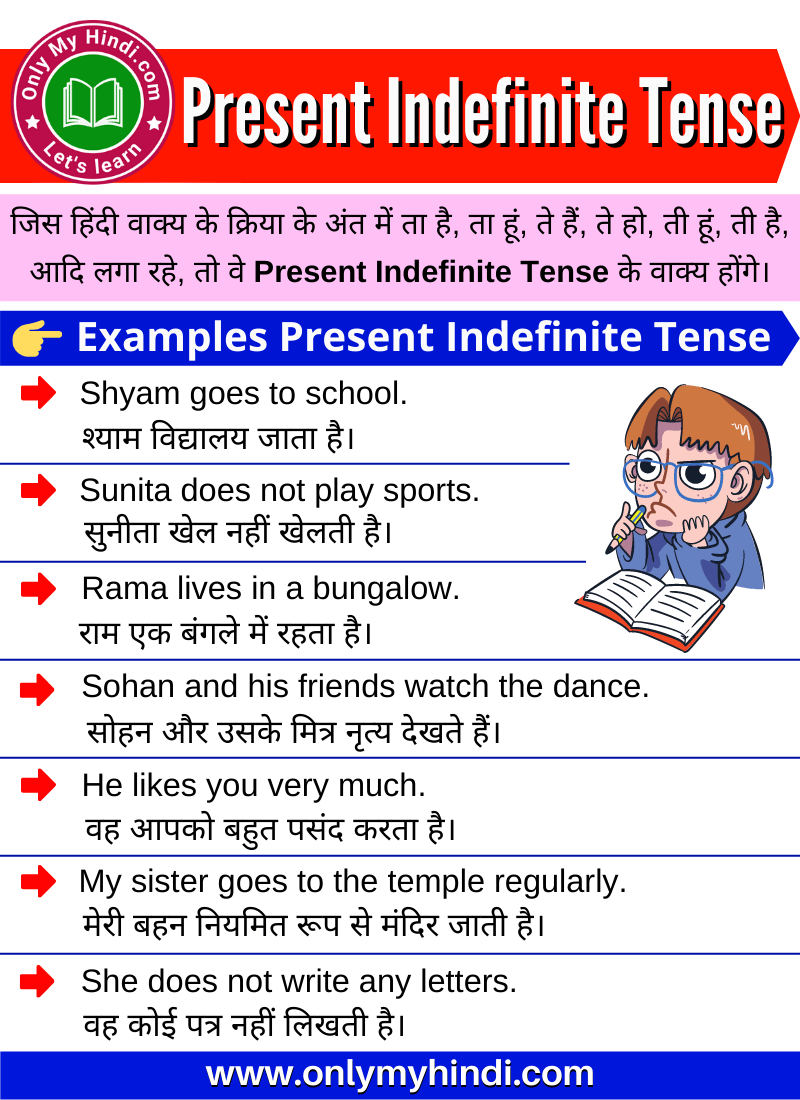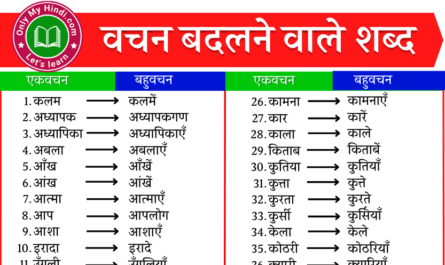क्या आप ढूंढ रहे हैं Present Perfect Tense in Hindi with Rules, Exercise and Examples? यहां पर हमने आपको सरल भाषा में समझाया है की Present Perfect Tense क्या होता है, और हम इसे किस तरह से इस्तेमाल कर सकते है।
Present Perfect Tense in Hindi
‘Present Perfect Tense’ को हम हिंदी में ‘पूर्ण वर्तमान काल’ अथवा ‘वर्तमान पूर्ण काल’ कहते हैं। इस Tense में उपयोग होने वाले वाक्यों से हमें यह पता चलता है की वर्तमान स्थिति में हो रहे कार्य पूर्ण हो चुके है। इस tense के वाक्यों में वर्तमान काल में काम का पूरा हो जाना पाया जाता है।
Present Perfect Tense की पहचान
‘Present Perfect Tense’ को हम किस तरह पहचान सकते हैं?
हिंदी वाक्यों के अंत मे ‘चुका है / हूँ’, ‘चुकी है / हूँ’, ‘या है / हूँ’, ‘आ है / हूँ’, ‘ये है / हैं ‘ आदि जैसे शब्द आते हैं तो उस वाक्य को हम Present Perfect Tense Sentence (पूर्ण वर्तमान काल के वाक्य) कह सकते हैं।
Present Perfect Tense के अंग्रेजी वाक्यों में helping verb ‘have / has’ का उपयोग होता है और इस tense वाले वाक्यों में जो verb का प्रयोग होता है वह verb का third form होता है, यह कार्य के पूर्णता को दर्शाता हैं।
Formula: Subject + have / has + verb (ed / third form) + Object.

Present Perfect Tense Examples in Hindi
- I have written a letter.
मैंने एक पत्र लिखा है।
- She has gone to Pune.
वह पुणे गई है।
- Shivam has finished his dinner.
शिवम ने अपना भोजन समाप्त कर लिया है।
- We have seen him everywhere.
हमने उसे हर जगह देखा है।
- They have performed really well.
उन्होंने वास्तव में अच्छा प्रदर्शन किया है।
Types of Present Perfect Tense in Hindi
Present Perfect Tense के वाक्यों के कुल तीन प्रकार होते हैं।
- Affirmative sentence (सकारात्मक वाक्य)
- Negative sentence (नकारात्मक वाक्य)
- Interrogative sentence (प्रश्नवाचक वाक्य)
Affirmative Sentence
‘Affirmative sentence’ of Present Perfect tense पूर्ण वर्तमान काल के सामान्य सकारात्मक वाक्य है जो किसी हो रहे कार्य के सकारात्मक तरीके से पूर्ण होने का संदेश देते हैं।
Affirmative sentence की रचना:
Formula: Subject + have / has + verb (ed / third form) + Object.
Examples,
- Rahul has sung a beautiful song.
राहुल ने बहुत अच्छा गाना गाया है।
- They have observed some people.
उन्होंने कुछ लोगों को देखा है।
- She has completed her assignments.
उसने अपना कार्य पूरा कर लिया है।
- We have listened to all your songs.
हमने आपके सभी गाने सुने हैं।
- He has waited for the cab.
उन्होंने कैब का इंतजार किया है।
Negative Sentence
‘Negative sentence’ of Present Perfect tense पूर्ण वर्तमान काल के सामान्य नकारात्मक वाक्य है जो किसी पूर्ण हुए कार्य को नकारात्मक तरीके से दर्शाते हैं।
इन वाक्यों में जो helping verb है उनके साथ not का इस्तेमाल होता है जो नकारात्मकता को दर्शाता हैं।
Negative sentence की रचना:
Formula: Subject + have / has + not + verb (ed / third form) + Object.
Examples,
- Gulam has not sung a beautiful song.
गुलाम ने कोई खूबसूरत गाना नहीं गाया है।
- They have not observed some people.
उन्होंने कुछ लोगों को नहीं देखा है।
- She hasn’t completed her assignments.
उसने अपना असाइनमेंट पूरा नहीं किया है।
- We haven’t listened to all your songs.
हमने आपके सभी गाने नहीं सुने हैं।
- He has not waited for the cab.
उन्होंने कैब का इंतजार नहीं किया है।
Interrogative Sentence
‘Interrogative sentence’ of Present Perfect tense पूर्ण वर्तमान काल के सामान्य प्रश्नात्मक वाक्य है जो किसी पूर्ण हुए कार्य को प्रश्नात्मक तरीके से पूछे जात हैं।
प्रश्नात्मक वाक्य helping verbs से शुरू होता है और अंत में Question mark से ख़त्म होता है जो प्रश्नात्मकता को दर्शाता है।
Interrogative sentence की रचना:
Formula: Have / has + Subject + verb (ed / third form) + object + ?
Have / has + Subject + not + verb (ed / third form) + object + ?
Examples,
- Has Rahul sung a beautiful song?
क्या राहुल ने एक खूबसूरत गाना गाया है?
- Have they observed some people?
क्या उन्होंने कुछ लोगों को देखा है?
- Has she completed her assignments?
क्या उसने अपना कार्य पूरा कर लिया है?
- Have they listened to all your songs?
क्या उन्होंने आपके सभी गाने सुने हैं?
- Has he waited for the cab?
क्या उसने कैब का इंतजार किया है?
- Has Rahul not sung a beautiful song?
क्या राहुल ने सुन्दर गीत नहीं गाया है?
- Have they not observed some people?
क्या उन्होंने कुछ लोगों को नहीं देखा है?
- Has she not completed her assignments?
क्या उसने अपना कार्य पूरा नहीं किया है?
- Have they not listened to all your songs?
क्या उन्होंने तुम्हारे सारे गीत नहीं सुने?
- Has he not waited for the cab?
क्या उसने कैब का इंतजार नहीं किया है?
Present Perfect Tense Sentences in Hindi
For Affirmative sentences,
- He has played well in the tournament.
उन्होंने टूर्नामेंट में अच्छा खेला है।
- Rajesh has completed his task on time.
राजेश ने अपना कार्य समय पर पूरा कर लिया है।
- Raghav has worked on this project.
राघव ने इस प्रोजेक्ट पर काम किया है।
- Mamata has left the program in between.
ममता बीच में ही कार्यक्रम छोड़ चुकी हैं।
- That noise has disturbed everyone.
उस शोर ने सभी को परेशान कर दिया है।
- Sonam has picked a taxi.
सोनम ने टैक्सी ली है।
- Raghu has arrived home on time.
रघु समय से घर आ गया है।
- Sanket has opened a hair salon.
संकेत ने एक हेयर-सैलून खोला है।
- We have climbed Mount Everest.
हम माउंट एवरेस्ट पर चढ़ चुके हैं।
- They have finished the game.
उन्होंने खेल खत्म कर दिया है।
For Negative sentences,
- He has not played well in the tournament.
उन्होंने टूर्नामेंट में अच्छा प्रदर्शन नहीं किया है।
- Rajesh has not completed his task on time.
राजेश ने अपना कार्य समय पर पूरा नहीं किया है।
- Raghav has not worked on this project.
राघव ने इस प्रोजेक्ट पर काम नहीं किया है।
- Mamata has not left the program in between.
ममता ने कार्यक्रम को बीच में नहीं छोड़ा है.
- That noise has not disturbed everyone.
उस शोर ने सभी को परेशान नहीं किया।
- Sonam has not picked a taxi.
सोनम ने टैक्सी नहीं चुनी है।
- Raghu has not arrived home on time.
रघु समय से घर नहीं पहुंचा।
- Sanket has not opened a hair salon.
संकेत ने हेयर सैलून नहीं खोला है।
- We have not climbed Mount Everest.
हम माउंट एवरेस्ट पर नहीं चढ़े हैं।
- They have not finished the game.
उन्होंने खेल खत्म नहीं किया है।
For Interrogative sentences,
- (Interrogative Affirmative sentences)
- Has he played well in the tournament?
क्या उसने टूर्नामेंट में अच्छा खेला है?
- Has Rajesh completed his task on time?
क्या राजेश ने अपना कार्य समय पर पूरा कर लिया है?
- Has Raghav worked on this project?
क्या राघव ने इस प्रोजेक्ट पर काम किया है?
- Has Mamata left the program in between?
क्या ममता ने कार्यक्रम बीच में ही छोड़ दिया है?
- Has that noise disturbed everyone?
क्या उस शोर ने सभी को परेशान कर दिया है?
- Has Sonam picked a taxi?
क्या सोनम ने टैक्सी चुनी है?
- Has Robin arrived home on time?
क्या रॉबिन समय पर घर आ गया है?
- Has Sanket opened a hair salon?
क्या संकेत ने हेयर सैलून खोला है?
- Have we climbed Mount Everest?
क्या हम माउंट एवरेस्ट पर चढ़ गए हैं?
- Have we finished the game?
क्या हमने खेल खत्म कर दिया है?
- (Interrogative Negative sentences)
- Has he not played well in the tournament?
क्या वह टूर्नामेंट में अच्छा नहीं खेला है?
- Has Rajesh not completed his task on time?
क्या राजेश ने अपना कार्य समय पर पूरा नहीं किया है?
- Has Raghav not worked on this project?
क्या राघव ने इस प्रोजेक्ट पर काम नहीं किया है?
- Has Mamata not left the program in between?
क्या ममता ने कार्यक्रम को बीच में नहीं छोड़ा है?
- Has that noise not disturbed everyone?
क्या उस शोर ने सभी को परेशान नहीं किया है?
- Has Sonam not picked a taxi?
क्या सोनम ने टैक्सी नहीं चुनी है?
- Has Robin not arrived home on time?
क्या रॉबिन समय पर घर नहीं पहुंचा है?
- Has Sanket not opened a hair salon?
क्या संकेत ने हेयर सैलून नहीं खोला है?
- Have we not climbed Mount Everest?
क्या हम माउंट एवरेस्ट पर नहीं चढ़े हैं?
- Have we not finished the game?
क्या हमने खेल खत्म नहीं किया है?
Exercise for ‘Present Perfect Tense’ sentences
- He _________ to enjoy the moment. (come)
- What ____ we ____ with the giant alligator? (do)
- We _________ in the tournament. (not qualify)
- ____ she _____ all her debts? (pay)
- She __________ me to use her beauty products. (not allow)
- Boys ________ their act for the concert. (prepare)
- My father __________ me an ice cream. (not buy)
- _____ you _____ in love with someone? (fall)
- They ________ their destination. (reach)
- I ____________ her apologies. (not accept)
Answers:
- He has come to enjoy the moment. (come)
- What have we done with the giant alligator? (do)
- We have not qualified in the tournaments. (not qualify)
- Has she paid all her debts? (pay)
- She has not allowed me to use her beauty products. (not allow)
- Boys have prepared their act for the concert. (prepare)
- My father has not bought me ice cream. (not buy)
- Have you fallen in love with someone? (fall)
- They have reached their destination. (reach)
- I haven’t accepted her apologies. (not accept)
More Tenses


